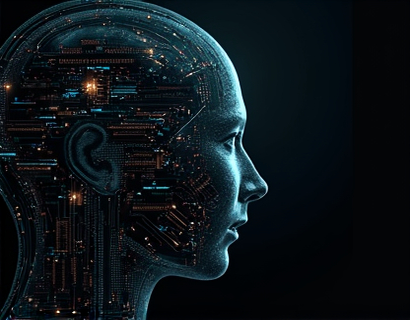AI and Crypto: Revolutionizing Digital Engagement for Next-Gen Ecosystem Experiences
The integration of artificial intelligence (AI) and cryptocurrency is ushering in a new era of digital engagement, transforming how users interact with online ecosystems. This synergy is not just a technological advancement but a paradigm shift that promises to redefine user experiences, security, and value creation in the digital space. For tech enthusiasts and investors, understanding this convergence is crucial for navigating the future of technology and finance.
The foundation of this revolution lies in the unique properties of blockchain technology, which underpins cryptocurrency. Blockchain's decentralized, transparent, and secure nature provides an ideal platform for AI applications to flourish. By leveraging blockchain, AI systems can operate with enhanced trust and reliability, ensuring that data integrity and user privacy are maintained at all times.
Enhanced Security through AI and Crypto
One of the most significant benefits of combining AI with cryptocurrency is the bolstered security it offers. Traditional digital ecosystems often struggle with security breaches and data leaks, which can erode user trust and hinder adoption. AI, with its advanced analytics and machine learning capabilities, can detect and mitigate threats in real-time, providing a robust defense against cyber attacks.
Blockchain's inherent security features, such as cryptographic hashing and consensus mechanisms, complement AI's protective measures. The immutable nature of blockchain ensures that once data is recorded, it cannot be altered without detection. This dual-layer security approach creates a highly secure environment for users, making it an attractive solution for applications ranging from financial services to healthcare.
Personalized User Experiences
AI-driven personalization is another key area where the integration of AI and cryptocurrency is making a significant impact. Traditional digital platforms rely on basic algorithms to recommend content or products, often resulting in a one-size-fits-all approach. AI, however, can analyze vast amounts of user data to create highly personalized experiences tailored to individual preferences and behaviors.
In a cryptocurrency-enhanced ecosystem, users can be rewarded for engaging with personalized content or participating in platform activities. This not only enhances user satisfaction but also fosters a more engaged and loyal community. For instance, users could earn tokens for completing tasks or providing valuable insights, which can be used within the ecosystem or exchanged for other assets.
Tokenization of Rewards and Incentives
The tokenization of rewards and incentives is a game-changer in user engagement. By issuing unique tokens that represent value within the ecosystem, platforms can motivate users to participate actively. These tokens can serve multiple purposes, such as voting rights, access to premium content, or even trading on cryptocurrency exchanges.
For example, a decentralized social media platform could issue tokens to users who create high-quality content or engage in meaningful discussions. These tokens would not only reward users but also encourage high-quality interactions, thereby improving the overall quality of the platform. This model aligns user interests with the platform's goals, creating a symbiotic relationship.
Decentralized Governance and Community Empowerment
Decentralized governance is another transformative aspect of AI and crypto integration. Traditional centralized systems often face criticism for their lack of transparency and user control. Blockchain-based governance models, powered by AI, can democratize decision-making processes, allowing users to have a direct say in the development and direction of the ecosystem.
AI can facilitate this by analyzing user feedback, identifying trends, and proposing actionable insights. Smart contracts, self-executing contracts with the terms directly written into code, can automate governance processes, ensuring that decisions are implemented transparently and efficiently. This empowers the community, builds trust, and fosters a sense of ownership among users.
Automated Decision-Making
Automated decision-making through AI and blockchain can streamline various aspects of ecosystem management. For instance, AI can monitor network performance, resource allocation, and user behavior to optimize operations. Smart contracts can then execute predefined actions based on these insights, such as adjusting reward distributions or updating platform features.
This level of automation not only reduces the burden on human administrators but also ensures that decisions are based on real-time data and objective criteria. Users benefit from a more responsive and efficient ecosystem, while developers can focus on innovation rather than routine management tasks.
Innovative Business Models
The convergence of AI and cryptocurrency is also giving rise to innovative business models that redefine value creation in the digital space. Traditional revenue streams, such as advertising and subscription fees, are being complemented or replaced by token-based economies.
In a token-driven ecosystem, value is created through the utility and scarcity of tokens. Users can earn tokens by contributing to the ecosystem, and these tokens can be used to access services, participate in governance, or traded for other assets. This creates a dynamic and fluid economy that rewards active participation and innovation.
Decentralized Finance (DeFi)
Decentralized Finance (DeFi) is a prime example of an innovative business model powered by AI and cryptocurrency. DeFi platforms use blockchain to offer financial services such as lending, borrowing, and trading without intermediaries. AI algorithms can enhance these services by providing predictive analytics, risk assessment, and automated trading strategies.
Users can benefit from higher returns and greater financial inclusion, while developers can build robust and scalable financial systems. The transparency and security of blockchain ensure that transactions are trustworthy, reducing the risk of fraud and enhancing user confidence.
Challenges and Considerations
While the integration of AI and cryptocurrency offers numerous benefits, it also presents challenges that need to be addressed. Regulatory uncertainty, technical complexity, and user education are key areas that require attention.
Regulatory Landscape
The regulatory environment for cryptocurrency and AI is still evolving, and businesses operating in this space must navigate a complex and often unpredictable landscape. Compliance with existing regulations and advocacy for clear guidelines are essential for sustainable growth. Collaboration with regulatory bodies to establish frameworks that promote innovation while protecting users is crucial.
Technical Challenges
Technically, integrating AI with blockchain requires robust infrastructure and expertise. Ensuring scalability, interoperability, and efficiency is essential for a seamless user experience. Developers must also address issues related to data privacy, as sensitive user information is processed and stored on the blockchain.
User Education
Educating users about the benefits and risks of AI and cryptocurrency is vital for widespread adoption. Many individuals are still unfamiliar with these technologies, and misconceptions can hinder their acceptance. Providing clear, accessible information and user-friendly interfaces can help bridge this knowledge gap and encourage more people to engage with these innovative solutions.
Future Prospects
The future of AI and cryptocurrency integration holds immense potential for further innovation and transformation. As technology advances, we can expect more sophisticated AI algorithms, enhanced blockchain capabilities, and broader adoption across various industries.
One exciting area is the development of AI-powered virtual assistants that operate on blockchain networks, providing secure and personalized assistance to users. Another is the creation of decentralized marketplaces where AI optimizes matching algorithms to connect buyers and sellers efficiently and fairly.
Moreover, the intersection of AI, cryptocurrency, and other emerging technologies like the Internet of Things (IoT) and augmented reality (AR) could lead to groundbreaking applications. For instance, AI-driven IoT devices could interact seamlessly within a blockchain-based ecosystem, enabling smart homes, cities, and industries to function with unprecedented efficiency and security.
In conclusion, the integration of AI and cryptocurrency is revolutionizing digital engagement by enhancing security, personalization, governance, and business models. While challenges exist, the potential benefits for tech enthusiasts and investors are significant. By staying informed and embracing these advancements, the next generation of digital ecosystems will offer unparalleled experiences and opportunities.











































